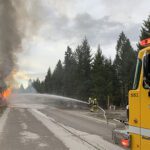Home »

Wind and smoke warning for region
Environment Canada and the B.C. Ministry of Environment have issued a special weather statement covering high winds coming into the region, as well as a special air quality statement for smoke.
It is going to be a windy weekend across the BC Interior, Environment Canada warns.
“The ridge of high pressure that has been dominating the weather over southern B.C. will give way to a cold front on Saturday. Widespread winds of 20 to 50 km/h are expected beginning Saturday afternoon over the central and southern interior. The strong winds will push into the Kootenays by early Sunday morning. Local winds gusts up to 70 km/h are possible through some interior valleys and canyons,” the weather statement notes.
The only rain accompanying the front is expected north of the Cariboo region.
There is also the risk of lightning over the central and northern Interior as well as over the Kootenays and Columbias. Temperatures will drop by six to eight degrees in the wake of the front Sunday. Unfortunately, significant rain continues to elude the southern half of the province for the foreseeable future.
According to the BC Wildfire Service, this forecast weather has to the potential to challenge their efforts to contain the many large wildfires currently burning across southern B.C., and could cause growth on a number of these incidents.
Additionally, smoke is causing poor air quality and reducing visibility.
The Ministry of Environment, in collaboration with the Interior Health Authority, has issued a Smoky Skies Bulletin for Kinbasket, North Columbia, West Columbia, East Columbia, Yoho Park – Kootenay Park, East Kootenay, West Kootenay, Elk Valley, Kootenay Lake, Arrow Lakes – Slocan Lake, Boundary, the Cariboo, Chilcotin, 100 Mile, North Thompson, South Thompson, Shuswap, the Okanagan, Similkameen, Fraser Canyon and Nicola regions, because of forest fire smoke that is covering the area.
Smoke concentrations will vary widely as winds, fire behaviour and temperatures change.
Avoid strenuous outdoor activities. If you are experiencing any of the following symptoms, contact your health care provider: difficulty in breathing, chest pain or discomfort, and sudden onset of cough or irritation of airways. Exposure is particularly a concern for infants, the elderly and those who have underlying medical conditions such as diabetes, and lung or heart disease.
What is a Smoky Skies Bulletin?
1) A Smoky Skies Bulletin is a new type of public notice being issued by the Ministry of Environment, in collaboration with the Northern Health Authority, to improve communication on wildfire smoke.
2) It will be issued when smoke concentrations in an area have, or may, reach levels that are of concern for human health.
3) Such decisions are based on satellite information, smoke transport models, photographs of visual air quality, first-hand observations from the area, in addition to concentrations of fine particulate matter recorded at local air quality stations.
a) In most fire seasons, there are occasions when smoke from forest fires is carried into our region.
b) Under these conditions, smoke concentrations may vary dramatically over short periods and over small distances.
c) Those members of the public who are sensitive to the effects of smoke should monitor their symptoms and, if necessary, take steps to reduce their exposure to smoke.
d) During the fire season, a heavy bluish-white haze, possibly accompanied by the smell of smoke, are clear indications that smoke concentrations are higher than usual. The concentrations and air quality health index measured at an air station many kilometres away may not be a good indication of local smoke conditions.
This bulletin will remain in effect until further notice.
Individuals may experience symptoms such as increased coughing, throat irritation, headaches or shortness of breath. Children, seniors, and those with cardiovascular or lung disease, such as asthma, are especially at risk.
Stay inside if you have breathing difficulties. Find an indoor place that’s cool and ventilated. Using an air conditioner that cools and filters air may help. If you open the windows you may let in more polluted air. If your home isn’t air-conditioned, consider going to a public place (library, shopping mall, recreation centre) that is air-conditioned.
e-KNOW







